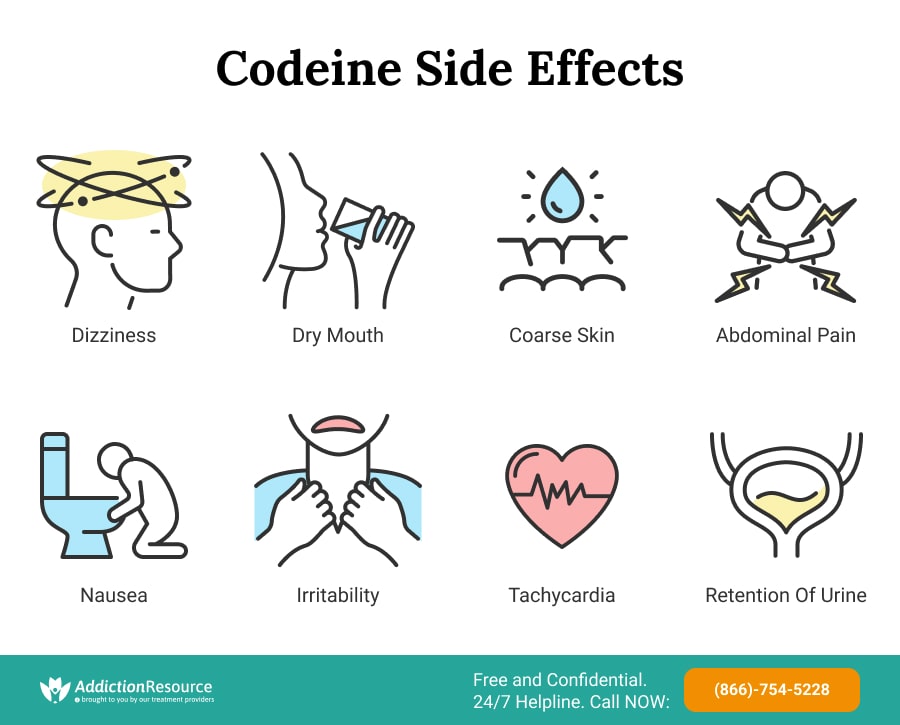Codeine belongs to a group of opioid medications used as pain medication. These drugs are well-known for their potentially harmful health effects, especially when the medicine is not taken as prescribed by the doctor. Knowing about the health effects in advance may help to reduce their occurrence. Also, the patient should check the precautions to avoid complications.
Table Of Contents:
Therefore, let’s take a look at the short- and long-term side effects of codeine, codeine allergy, drug use in children, and the dangers of a codeine overdose.
Short-Term Codeine Side Effects
Codeine side effects occur as the body responds to the changes brought by the use of the medication. Many factors can have an impact on the severity of these codeine effects. For example, these factors can be individual body characteristics, genetics, the presence of other diseases, consumption of alcohol, use with another medication, and the doses of medication they used. Also, if one takes a combination product, or purple drank (which is a recreational drink containing the drug), the symptoms may be more widespread.
If One Is Taking it Under a Doctor’s Prescription, Watch Out For the Following Codeine Side Effects:
- Feeling sick
- Constipation
- Dizziness and sleepiness
- Dryness of mouth
- Sweating
- Stomach pain
- Nausea and vomiting
- Breathing problems
Typically the codeine side effects from above do not pose a significant risk to one’s health. This is considering the information gotten from the many scientific studies done on the medication to date. Notably, many of them may gradually subside as the treatment continues and your body becomes used to the drugs’ symptoms. However, if they persist, worsen or cause significant problems, one should consult a doctor about taking the medication.

Apart from the symptoms mentioned above, there are also more dangerous codeine effects, which may require immediate medical attention from a doctor.
Severe Codeine Side Effects Can Cause:
- Dependence
- Convulsions
- Loss of consciousness
- Extremely slow breathing or heart rate
- Retention of urine
- Mental confusion
- Very low or high mood
- Difficulty passing urine
- Very weak pulse
If one experiences any of these codeine effects, discontinue the drug use and call a doctor.
Long-Term Codeine Effects
The drug is not typically prescribed for the treatment of chronic pain, so the long-term side effects of codeine are mostly seen in situations of abuse or long-term drug misuse. They are typically linked to addiction and are similar to short-term adverse health effects. They can vary widely based on the person’s health status, genetics, long-term use with other drugs, and how much of the drug one is taking and if it is regular.

Some of the long-term symptoms of taking such drugs may be irreversible, such as organ damage and certain mental health changes. However, immediate drug cessation is still recommended and can prevent further harm.
Some Long-Term Adverse Reactions Of Such Drugs Include:
- Insomnia and other sleep disturbances
- Pain
- Anxiety
- Depression
- Lethargy
- Confusion and delirium
- Seizures
- Gastrointestinal disturbances
- Liver damage
- Kidney damage
- Dependency and addiction
Codeine Allergy
Allergic reactions are adverse symptoms that can occur in response to any type of medicine. Some individuals are even allergic to codeine, and the cause of this is when the immune system shows an abnormally aggressive response to opioids or similar drugs. On the other hand, a body might be reacting to another ingredient used to make the medicine.

Of course, an allergy is a medical emergency and requires immediate attention from a doctor. This information means any delayed treatment can be potentially life-threatening and detrimental to your health.
Codeine Allergy Can Have One or Many of the Following Symptoms:
- Rashes on the skin
- Hives
- Severe itching
- Swelling of the lips, eyes, or tongue
- Difficulty breathing
- Chest tightness
- Racing heartbeat
- Blisters in the mouth
It’s worth noting that codeine allergy and opioid allergy, in general, is a rare condition. As a result, some patients can think they are allergic to the medication, while it is just a manifestation of typical adverse effects. In one study published in The Journal of Allergy and Clinical Immunology In Practice, out of 98 patients with suspected opioid allergy, only 15% were diagnosed with it. However, if you suspect that you or anyone close to you is allergic to codeine, you can present to a doctor for a confirmatory test called opioid drug provocation testing (DPT) and receive further information on the topic.
Opioid Use In Children: Increased Risk Of Death
In 2013, the FDA issued new information concerning the use of this drug in kids. It states that the drug could be fatal in kids who have had surgery to remove their tonsils. Therefore, one should take extra care when concerning the use of this drug with kids. FDA also warned that opioids can cause difficulty breathing if consumed by children under 12.
Watch Out For the Following Adverse Reactions Of Opioid Drugs in Children:
- Slowed or noisy breathing
- Unusual sleepiness
- Signs of confusion
Seek emergency medical help or call 911 if any of the symptoms mentioned above have been noticed.
Codeine Overdose
A codeine overdose occurs when an individual takes more than the recommended dose, whether accidentally or on purpose, leading to potentially life-threatening signs and symptoms. Like most opioid medications, without proper treatment, an overdose can quickly lead to death.
Some Of the Common Symptoms Of an Overdose Are:
- Breathing difficulties
- Cold, clammy skin
- Bluish discoloration of the lips or nails
- Constipation
- Nausea
- Vomiting
- Itching
- Confusion
- Constricted pupils
- Weakness
- Muscle spasms
- Drowsiness
- Lightheadedness/dizziness
- Delirium
- Loss of consciousness
- Coma
Please note that you should never attempt to handle an opioid overdose on your own. Seek medical help immediately and have information such as the person’s age, weight, and condition available. Also, take note of information such as the name, amount, and strength of the medicine ingested.
Avoiding the Dangers
The drug affects how the brain processes pain signals. Regrettably, the medicine also produces a high that can begin to take charge of the brain. Then, it can start a continuous cycle of abuse and loss. As a result, you could have a potential overdose and ultimately an addiction. All things considered, one should take the medicine in the doses, frequency, and duration recommended by the medical doctor. Even with that, there may still be a certain degree of risk of side effects and addiction due to the nature of such medications.

An opioid overdose is no trivial matter and should be taken quite seriously. The best way to prevent one from ever happening is to seek help if you struggle with opioid addiction. Professional drug rehabilitation centers will offer you the information, medical expertise, and social support you need to break the cycle of codeine abuse and dependence. The road may not be easy, but it’s a much better option than the alternative, which could be a potential drug overdose.
Hope Without Commitment
Find the best treatment options. Call our free and confidential helpline
Most private insurances accepted
Page Sources
- Yoo H. S., Yang E. M., Kim M. A., et al. A Case of Codeine Induced Anaphylaxis via Oral Route. Allergy, Asthma & Immunology Research. 2014; 6(1):95–97. doi:10.4168/aair.2014.6.1.95. https://www.ncbi.nlm.nih.gov/pmc/articles/PMC3881408/.
- Medline Plus. Codeine. 2019. https://medlineplus.gov/druginfo/meds/a682065.html.
- Long-term codeine use is associated with depressive symptoms. M K Romach, B A Sproule, E M Sellers, G Somer, U E Busto. August 1999. https://pubmed.ncbi.nlm.nih.gov/10440467/
- US National Library of Medicine. Codeine overdose. June 2019. https://medlineplus.gov/ency/article/002613.htm
- US National Library of Medicine. Codeine. December 2020. https://medlineplus.gov/druginfo/meds/a682065.html
- Philip H.Li, Kok Loong Ue, Annette Wagner, Ryszard Rutkowski, Krzysztof Rutkowski, Opioid Hypersensitivity: Predictors of Allergy and Role of Drug Provocation Testing, 2017. https://www.sciencedirect.com/science/article/abs/pii/S2213219817302490
- FDA Drug Safety Communication: FDA evaluating the potential risks of using codeine cough-and-cold medicines in children, 2018. https://www.fda.gov/drugs/drug-safety-and-availability/fda-drug-safety-communication-fda-evaluating-potential-risks-using-codeine-cough-and-cold-medicines
- FDA, Codeine and Tramadol Can Cause Breathing Problems for Children, 2017. https://www.fda.gov/consumers/consumer-updates/codeine-and-tramadol-can-cause-breathing-problems-children

 Authored by
Authored by  Reviewed by
Reviewed by 

